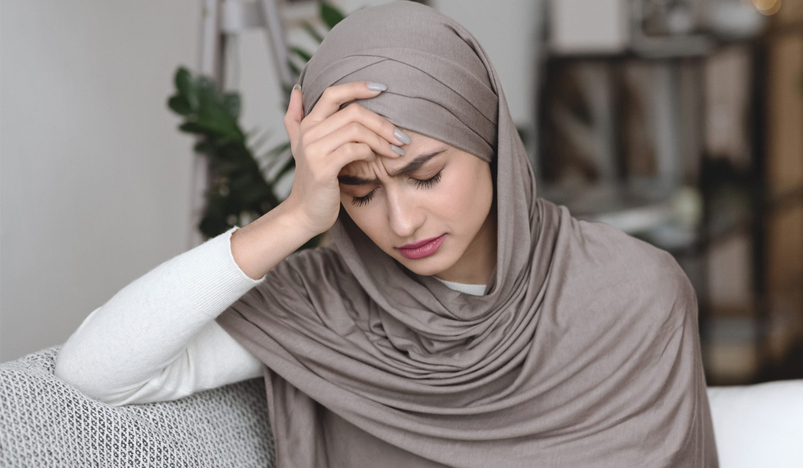
Headache
Headaches is a primary symptom for many fasting people, especially during the first days of the holy month of Ramadan, as a result of the rapid change in eating habits and the reduction of fluid consumption, changing sleep habits, which is staying up late for long hours, and not getting enough sleep at night.
In a special statement to Qatar News Agency (QNA), Senior Consultant of Emergency Medicine at Hamad Medical Corporations (HMC) Dr. Yousef Al Tayeb said that some may get a headaches before Iftar, and others after it, and it differs from one person to another, as it includes two types: primary headaches and secondary headaches.
Al Tayeb added that headaches often occur before breaking the fast (Iftar), due to a lack of glucose in the blood, and its level below normal levels, as Glucose is an important source of energy in the body, and food is its main source. After eating food and entering the process of digestion and metabolism, it turns into a simple sugar, known as glucose. It is transmitted to the cells of the body to be used by the various organs in it, to perform various vital operations.
Some may feel headaches after Iftar, and this often occurs as a result of indigestion and a full stomach that exceeds its need for food and drink, which puts pressure on the diaphragm, thus, it hinders the breathing mechanism, causing the fasting person to feel shortness of breath, fatigue and headache.
Dr. Yousef Al Tayeb provides 10 tips for fasting people to avoid headaches during the holy month, the most important of which is delaying Suhoor, eat a healthy and complete Suhoor meal that provides the body with energy throughout the fasting period. It is preferable that it be from slow-digesting foods, such as: grains, legumes, vegetables, fruits. Regulate sleeping hours in Ramadan and avoid staying up late and make sure to take a nap during the day. Drink large amounts of fluids around 3 liters to be taken from Iftar until Suhoor. in addition to maintaining a normal level of glucose in the blood by consuming a moderate amount of carbohydrates and sweets at Iftar and Suhoor meals. Eat healthy and complete Iftar meal to ensure having the necessary vitamins and minerals for the body without overheating. Stay in cold places during the day and avoid staying in the sun or in hot places as possible. Avoid performing hard work and delay it until after Iftar time to avoid sweating and maintain a hydrated body to avoid headaches during the day as well as thirst and dehydration.
Senior Consultant of Emergency Medicine at HMC stresses the importance of avoiding consuming caffeinated drinks and take your medicines regularly especially for chronic diseases and hypertension patients. Avoid stress and anxiety and reduce the time spent behind electronic screens.
(QNA)
.jpg)
Qatar Secures Place Among the World's Top 10 Wealthiest Nations
.jpg)
Hamad International Airport Witnesses Record Increase in Passenger Traffic

Saudi Arabia: Any visa holder can now perform Umrah

What are Qatar's Labour Laws on Annual Leave?
Leave a comment